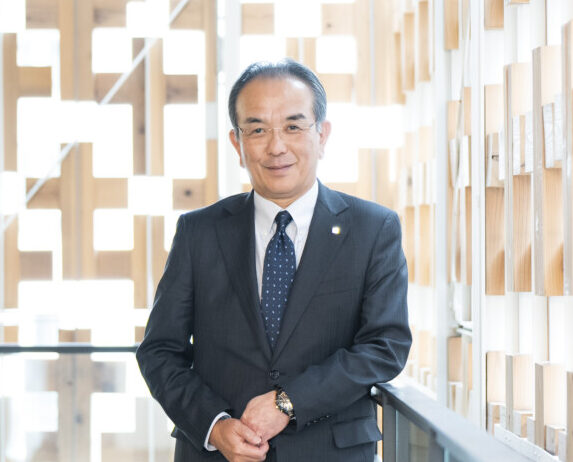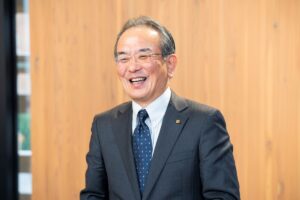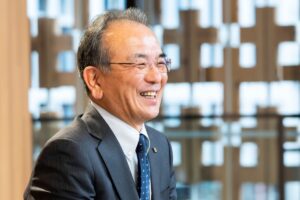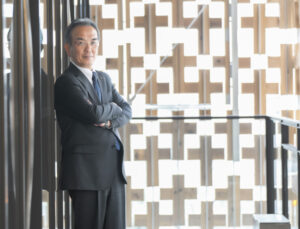Comments by donators
I want you to connect with various people and lead the future generation
Mr. Hideo Tanimoto President and Representative Director/Executive Director, KYOCERA Corporation

I studied inorganic chemistry at Sophia University and joined Kyocera Corporation
I’m from Nagasaki and lived there until I finished high school. I joined the table tennis club in my junior high school and continued this extracurricular activity through my high school years. However, when I was in my second year of high school, I was exposed to jazz and immediately fell in love with it. Even though the sessions used only musical instruments and basically had no vocalist, they attracted many people. I ended up quitting table tennis because I wanted more time to listen to jazz music.
When I was in my third year of high school, and with the university entrance exams fast approaching, I had to decide which university I wanted to apply for. I was a typical science student who was good at physics and chemistry but had no clue when it came to Japanese language and social studies. I had two options—either attending the local Nagasaki University or enrolling in a university in Tokyo. At the time, my aunt’s in-laws who ran a temple managed an apartment building in Tokyo, and my brother, who was two years older, had moved to Tokyo ahead of me to attend a university while living in that apartment. Because of that, I could live in the same apartment if I went to Tokyo.

As it turned out, I got into the Department of Chemistry (now the Department of Materials and Life Science) at the Faculty of Science and Technology of Sophia University. Jazz was still the first thing that came to mind in my university days, as I was deeply enthusiastic about it. I went to various concerts, including outdoor concerts held on a tennis court in Denenchofu. In addition, I often traveled by car with friends during long holidays such as summer holidays.
It might seem that I was just having fun in my undergraduate days; but in terms of learning, I majored in inorganic chemistry in my senior year and developed hydrofluoric acid-resistant glass. After graduating from university in 1982, I joined Kyoto Ceramic Company, Ltd. (current Kyocera Corporation). “Ceramic,” as in the company name, refers to a “non-metallic inorganic material that is heat-treated at very high temperatures during the manufacturing process.” My career at Kyocera began because I studied inorganic chemistry at Sophia University and gained knowledge in polymer pyrolysis.
“The Entrepreneurs Club of Sophia University’s Faculty of Science & Technology” provides support for doctoral students
Kyocera runs a wide range of manufacturing businesses, but in a nutshell, it is a company that manufactures parts. I committed myself to the fine ceramics business, which has been in operation since the foundation of the company. I worked at the Sendai and Kokubu plants in Kagoshima Prefecture for about 30 years, where I was engaged in the development of a firing furnace that could reduce the ceramics firing process time to 1/10 of the conventional process time. Then, after working in Shanghai for two years, I was appointed senior general manager of the fine ceramics division in 2014. As senior general manager, I started working at Kyoto Headquarters where I promoted the digitalization of business.
Because I worked in Kagoshima for a few decades, opportunities to come to Tokyo were limited to business trips, and I became less and less connected with the university. Nonetheless, I felt that my relationship with the university continued even after graduation, as I was wed at the Kulturheim Chapel of Sophia University Yotsuya Campus. My wife, who was my classmate in the chemistry department, was a polymer chemistry major. Together, we asked Dr. Naoya Ogata of the polymer laboratory to act as an intermediary (go-between), and it was decided that we would have our wedding at the Kulturheim Chapel.

Around the time when I became senior general manager in 2014, opportunities to meet with professors at Sophia University started to increase, and I was asked to give lectures. The themes of my lectures included renewable energy and corporate leadership theories. This re-established connection with the university was the reason behind my joining the Entrepreneurs Club of Sophia University’s Faculty of Science & Technology after I became president of Kyocera.
Mr. Koichi Nakayama, the representative director and CEO of Chemitox, Inc., is the founder of the Entrepreneurs Club of Sophia University’s Faculty of Science & Technology, which belongs to the University’s Faculty of Science & Technology Alumni Association and was established with the aim of 1) supporting the development of corporate managers from among graduates, 2) empowering students to become entrepreneurs, and 3) proposing industry–academia collaboration projects. Guided by the principle of “producing highly talented and enthusiastic doctorates from Sophia University who can play an active role on the global stage,” a system was established to provide scholarships for students enrolled in the doctoral program of the Faculty of Science and Technology over the course of three years until they earn a doctorate. As a member of the Entrepreneurs Club, I also donated to this scholarship system.
On a side note, Kyocera and Chemitox, a company engaged in the evaluation of polymer materials and parts, were originally in a business relationship. I had the opportunity to meet Mr. Nakayama when we placed a large order of evaluation tests, and it was there that I first learned the fact that he had graduated years earlier from Sophia University. There are not so many entrepreneurs who attended Sophia University, so when we meet, the topic of our student days becomes a common theme, and we get along naturally.
Connections with people and new combinations lead to innovation
In the future, my expectation for Sophia University is “to develop individuals who can take a leading role in various industries.” With the rapid evolution of AI, knowledge obtained by searching on a smartphone will no longer be of any value. Conventional education where knowledge is crammed into students’ heads will not be sufficient to produce individuals who can play an active role in society. I would like you to break through this wall through connections with people as a weapon.
Steve Jobs, one of Apple’s founders, changed the world with the iPhone. What made the iPhone revolutionary was that it incorporated a variety of functions, including a phone and a camera, into one product. Today, it is not easy to make inventions that no one has come up with yet, but instead, we can surprise the world by trying various combinations. The iPhone is an illustrative case.
In the previous era of mass production and mass consumption, countries with facilities capable of manufacturing products had power. Japanese companies developed because they were good at improving their facilities. This means that as long as industrial facilities are in place, any country can produce reasonably good products. Moreover, when competing for mass production, you cannot win against companies that receive large subsidies from the government. It is a fact that Japanese companies have lost in the global market share battles for both LED light and solar panels.
In order to continue growing in such an era, both products and organizations must have diversity as an added value. We must incorporate the opinions of various people, try new combinations, and bring about innovation. To do that, it is very important to have connections with various people. The reason the top-down management approach is no longer suitable is that it is not possible to incorporate diversity by focusing only on the opinions of one person.
Every university has frameworks such as arts and sciences, extracurricular activities and circles, and students build their community within each framework. However, exchanging opinions only among same-minded individuals would not lead to new creations. Sophia University has all its faculties integrated into one campus and international students from all over the world. It is a campus full of students with different aspirations and backgrounds. I hope that you will engage with various people in your university days and thrive on this experience in the future. I will introduce you to researchers from Kyocera if you are interested in learning more about their fields of expertise.
A few years ago, I was contacted by a student at Sophia University, asking whether I could cooperate with crowdfunding for the Sofia Festival. Impressed by the student’s ability to take action, I donated. I would love to continue cooperating with the university to the extent possible, and to support the ability of students to act, seeking connections outside of the university.


